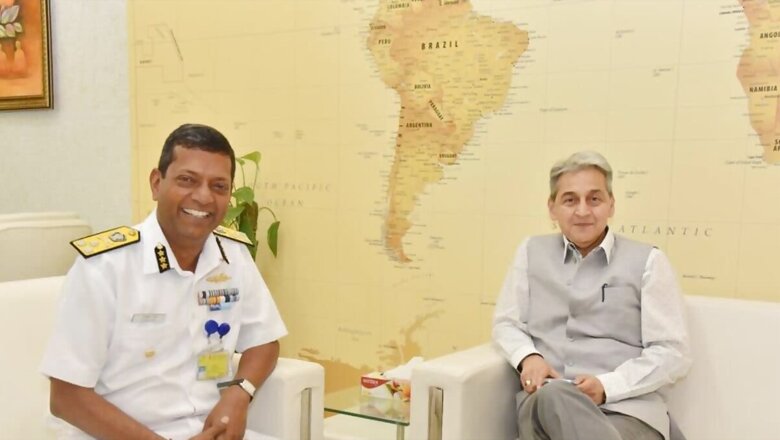
views
Astute, sharp, diligent and a problem solver — this is how peers, colleagues and former bosses describe Sudhansh Pant, the new Union health secretary.
Pant is the first health secretary who, following his tenure in the Department of Pharmaceuticals, brings with him technical knowledge concerning the drugs and pharmaceutical industry.
In June, in a bureaucratic reshuffle by the central government, Rajasthan cadre IAS officer Pant was named the new health secretary after Rajesh Bhushan was relieved of the charge.
Pant holds an engineering degree from the Indian Institute of Technology, Kharagpur, and joined the Indian Administrative Service (IAS) in 1991.
With general elections in less than a year, experts believe it could be a very challenging time for the new Union health secretary.
One of his top challenges is quickly safeguarding India’s reputation as the “pharmacy to the world” by addressing the issue of sub-standard and low-quality drugs. Pant is also expected to overhaul the country’s apex health regulatory agency, Central Drugs Standard Control Organisation (CDSCO).
The pending issue of e-pharmacies too is awaiting regulatory clarity apart from several other issues such as sustaining the momentum and focus on healthcare in the post-Covid world, making India ready for the next pandemic and pushing the research and innovation in healthcare.
Another important issue is meeting the deadline for the elimination of tuberculosis by 2025 — five years ahead of the global deadline as promised by Prime Minister Narendra Modi. Pant may also need to check the progress of targets (which are currently lagging) fixed by India’s National Health Policy which was released over six years ago.
What makes Pant the ideal choice?
“Pant is an ideal officer to hold the position of health secretary,” Dr VK Subburaj, former secretary, department of pharmaceuticals, said.
Pant was joint secretary under Subburaj in 2015-16 where he was working on several critical issues, including the price control mechanism of medicines and the growth and expansion of the National Institute of Pharmaceutical Education and Research (NIPER).
“He has got good experience in both pharma and health ministries, which is quite unique. Pant understands the subject really well and his approach is problem-solving and practical.”
Subburaj also believes that Pant is good at handling “crisis situations”. This can be gauged by the fact that Pant — who returned to Jaipur in January 2020 after his deputation period in Delhi ended — was called back by the health ministry in March 2020 during the Covid-19 outbreak.
He was given the position of officer-on-special duty (OSD) in the ministry to handle critical tasks. “While he was called for a period of two months on a temporary basis, he was not released for over nine months,” said an official who did not wish to be named.
Pant is also credited with improving the quality of drugs sold under the Modi government’s flagship Jan Aushadhi scheme. “He made WHO-GMP standards compulsory in 2016 during his tenure as chairman at the governing council of Bureau of Pharma PSUs of India (BPPI) in 2016-17,” said the official quoted above.
In 2015, the Prime Minister’s Office (PMO) asked the Department of Pharmaceuticals to probe the astronomical price mark-ups on generic medicines. After the nudge, Pant, who was the joint secretary in the department of pharmaceuticals, was asked to lead the committee and bring a report. He headed the committee, known as Pant Committee, which made a recommendatory report on trade margins.
Early career
In the early years of his career, Pant worked as a collector and district magistrate in Jaisalmer, Bhilwara, Jhunjhunu and Jaipur.
From mining, petroleum, housing to electricity, pharma and health, Pant has experienced a wide range of assignments in the last three decades of his career.
He has worked as chairman of the State Power Transmission Corporation, the State Renewable Energy Corporation and the State Power Distribution Companies.
According to his profile at India-EU Health Conference, he has held the position of secretary at the Mines and Petroleum Department in the government of Rajasthan.
Challenges ahead
According to health experts and industry veterans, one of the biggest challenges that Pant needs to resolve immediately is the quality of medicines manufactured in India.
Starting in October last year, several drug alerts by global health agencies, including the World Health Organisation (WHO), Uzbekistan, Gambia, United States of America, Marshall Islands and Micronesia have raised questions over the manufacturing of Indian drug products and created a trust deficit.
“Having served in the Department of Pharmaceuticals and then subsequently in the Ministry of Health, Pant is very familiar with the pharma sector. He would have to work with the new Drug Controller General of India (at CDSCO) to ensure there is no room for manufacturing that does not conform to norms,” Malini Aisola, public health expert and co-convener of NGO All India Drug Action Network (AIDAN), said.
According to Dr Chandrakant Lahariya, physician and public health policy specialist, the key challenges for the new health secretary are to get health and wellness centres functioning and ensure that more services for non-communicable diseases are developed. “Health needs more funds and his skills to negotiate with the Ministry of Finance would determine health sector funding.”
Lahariya hopes that Pant’s past experience in health ministry would help him steer those challenges.
Another long-pending issue is the clarity on e-pharmacies or online sales of drugs. The new draft of the bill indicates the central government will permit e-pharmacies to operate but they may create a licensing mechanism.
“This will be a game-changer,” Aisola said, adding that “e-health platforms have been operating without the need to conform to any health regulations for products (medicines) or services (telemedicine, diagnostics). The details for requirements for licensure would need to be worked out”.
Another tricky issue for the health ministry is the regulation of the Uniform Code of Pharmaceutical Marketing Practices (UCPMP) — a voluntary code issued by the government to curb gifting to healthcare professionals, including doctors. Pant was involved in drafting the order to regulate marketing and promotion but it was not cleared by the law ministry.
Lahariya also pointed out it is more than six years since India’s national health policy was released and most of the targets set are lagging. “It definitely is time when he needs best wishes from everyone,” he said.

















Comments
0 comment